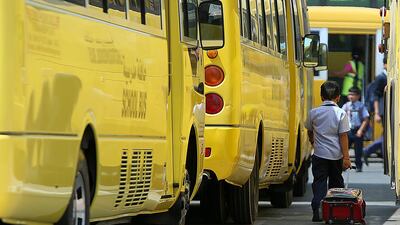We already know that the Dubai Schools Inspection Bureau (DSIB) takes its education model straight out of the Ofsted playbook in England and that the UAE unified inspection framework is modelled on UK inspections.
With the recent school fee freeze putting a squeeze on school providers, will we see even more parallels with the UK state sector going forward?
With the number of schools in Dubai set to continue growing at a rate of between 10 and 12 new institutions a year, the Knowledge and Human Development Authority (KHDA) will soon need to seek a new inspection model.
The DSIB is already struggling to find enough inspectors each year, causing them increasingly to rely on a pool of retired inspectors from the UK without recent experience of life at the coal face.
Ofsted itself faces a similar issue: Robert Hill, a former policy adviser to Tony Blair, warned that its diminished funding meant resources for inspection were “now very definitely finite”.
When we consider the recent freeze on school fees in Dubai, the parallels to the UK system become even greater. The financial viability of schools working on the basis of certain cashflow projections has been left in tatters. Even Gems Education, the largest schools group in the emirate, has had to shelve plans for its $5 billion IPO, freeze teacher salaries and is rumoured to be cutting 75 jobs from its corporate head office.
For new schools starting out in Dubai at a time when many families are leaving the emirate, these reforms could not be happening at a worse time. The blanket fee freeze, coupled with an oversupply of school places, which had already compelled many schools to reduce their school fees or offer significant discounts, seems likely to drive down the price of education in Dubai for several years to come.
No doubt this news is welcomed by some parents whose budgets have been stretched by the introduction of VAT and year-on-year fee rises. But the important point is that schools don't usually raise their fees simply to increase profits.
More often than not, fees are increased to enable educators to keep pace with the rising costs of running an institution. In recent years schools have been asked to reshape their week and staffing to accommodate the introduction of the national state curriculum. Today, UAE social studies, moral education, Arabic and Islamic studies account for about 20 per cent of the curriculum, or one school day out of five.
In addition, schools have had to contend with regular inflation, VAT on educational supplies and the cost of teacher licensing for several hundred staff members. Fulfilling these national state education requirements alone is likely to cost schools somewhere in the region of 2 or 3 per cent more next year than this.
That is before we consider any of the schools' own strategic development plans.
This year’s fee freeze is actually a zero-sum game. A parent’s personal financial gain equates to the school’s loss, so the net benefit is zero. Since staff salaries and benefits are the single biggest cost to any school, it is clear that this is where most schools will look to make savings.
Yet as the global teacher recruitment crisis accelerates (we will need every teacher in England to move abroad if we are to staff the growing number of international schools by 2025) we need to consider alternatives.
If we look at the UK, we see a state of economic uncertainty, with school budgets significantly reduced in years to come.
Consequently, since the introduction of the Academies Act in the UK in 2010, UK schools have begun moving towards multi-school collectives. First there were loose collaborations followed by umbrella trusts and federations and it now seems likely that all state schools will need to form or join a Multi-Academy Trust (MAT) for one simple reason: financial viability.
So what about Dubai? We have already seen Indian and Pakistani schools form a loose association along with the British Schools in Dubai group. In order to capitalise on the efficiencies required by schools moving forward, both to compete with the economies of scale already afforded to the likes of Gems and Taleem and to combat fee freezes, can we formalise these loose collaborations with other schools in order to centralise procurement, professional review, research and development and offer clearer career progression?
Ofsted’s current chief inspector Amanda Spielmark recently told British MPs: “I think the view we can get just by looking at subsets of schools in a MAT is very significantly more limited than the view we would get by looking at the whole of a MAT.”
MATs, she remarked, are “highly integrated operations”, which Ofsted needs to “look properly”. The intention is now to inspect the central services of trusts rather than leaving trusts to self-evaluate.
Is the birth of multi-school groups in Dubai the solution to burgeoning demands on the DSIB and the economic demands on schools?
If so there are significant bridges to be built and egos to be massaged as headmasters running privately owned schools learn to subordinate their own personal ambitions for the greater good of the educational landscape.
Michael Lambert is headmaster of Dubai College


